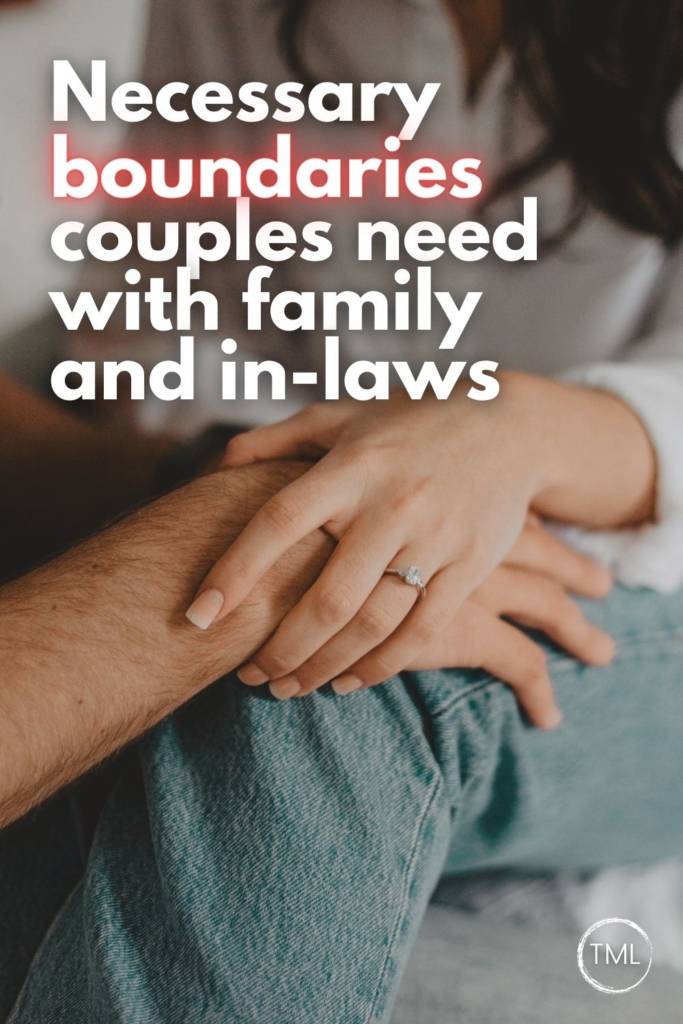Does the Holiday season divide your marriage year after year?
The Holidays can easily be one big stress ball for many, even couples. This is especially if you are dealing with a spouse who won’t respect your wishes, compromise, or share traditions. So if the Holidays end up dividing your marriage, then this post is for you.
Or head on over if you’re dealing with a spouse who doesn’t celebrate Christmas or the Holidays.
And, hey, if you are that spouse who tends to get their way through unnecessary strife, listen up – you need to read this post more than anyone.
More importantly, we need to stop painting this picture that the Holidays represent buried internal “suffering” for just one day – where we’re expected to abandon our needs (and sanity) in the name of family loyalty.
And just an FYI, this post works both ways and I am speaking to either spouse in this scenario. Commonly, they are conveyed like this:
“My husband wants to spend every Holiday with his family,” or “My wife expects every Holiday to revolve around her parents.” And so on – hopefully you get the picture.
This isn’t new by any means, but it has certainly become more prominent over generations. In the past, my husband has even alluded to the fact that my family tends to default to the longer stick when it comes to the Holidays, the logistics, when and how they’re spent.

When the Holidays are one big stress fest and your spouse won’t compromise
From financial trouble, bouncing from one relative’s house to another, and [toxic] family dysfunction, unrealistic expectations, one-sided compliance, internalized guilt or shame, to abandoning our needs and extending beyond our individual capacity for the sake of avoiding confrontation, judgment, or disappointment from your spouse and family.
Oof, that’s a mouthful. And when you’re married, times that by two. Double ouch. Then add children in the mix – it’s no wonder people are combusting.
Hopefully when you were dating your spouse, the Holidays, passed-down family traditions, and future [Holiday] expectations were a topic you heavily discussed or navigated as a couple prior to marriage.
This is yet another important factor to consider now that personal values have become more diverse, because not everyone values Holidays the same or at the same level. And this is an integrated normative in culture. Unfortunately, the partner who values strict Holiday traditions less (is more flexible, rather) usually winds up footing the bill (or taking the blow).
Even so, everyone’s Holiday ideals can change from season to season, which means keeping the line of communication open through each passing season is crucial.
What to expect in this post…
While the answer is probably always *easy* – “…do whatever is necessary to keep the peace (because, you know, it’s the Holidays)…” – that does not somehow mean you are expected to over-give or over-extend yourself year after year.
It also doesn’t mean one partner is somehow justifiably accommodated.
So if you want to avoid completely dreading the Holiday season and to hinder the cycle of divide with your spouse year after year, your marriage needs boundaries.
![[If Your Spouse Won't Compromise On The Holidays] 6 Boundaries Your Marriage NEEDS | Holidays for couples bring about an added stress - there are now two families to tie in and consider. But if you're experiencing more stress, or dread, around the Holidays with your spouse... it's because your marriage requires boundaries to be set, heard and valued. #holidaystress #marriage #boundaries #compromise | theMRSingLink](https://themrsinglink.com/wp-content/uploads/2019/11/boundaries-for-your-marriage-if-you-dread-the-Holidays-PIN-1-684x1024.jpg)
As always, the thoughts, insights, beliefs and opinions expressed throughout this post are my own. If you have any personal or specific questions, feel free to reach out to me!
Preferably, be *somewhere* on the same page
Again, hopefully you and your spouse have discussed what the Holidays mean to you as individuals, what family traditions you cherish, and what your ideal way(s) to spend the Holidays looks like. Hopefully you’ve discussed how you would honor the differences, too.
But if you’ve sided with your partner’s ideals, or expectations, year after year (because that’s just *easier* than making a big stink) or you’ve taken the high road (“I do what I want with or without you”), that isn’t exactly conjoining your lives respectively.
Being somewhere on the same page may look like you and your partner both valuing spending the Holidays together, regardless of where or who’s family you go to. It can also look like preferring to host the holidays (and/or have family come stay and visit) versus doing the traveling.
Communicating this can sound like,
“You prefer to host (and have family come visit) for the holidays while I also prefer to avoid traveling to multiple places (and dragging our kids along in the process). Let’s continue to honor this tradition for our family, whether that be for Thanksgiving, Christmas or both.“
“We agree that we should make the holidays fair between both our families, but it doesn’t always make sense to cram both families in for each holiday every single year. It’s more important to focus on fairness even if that means only spending each holiday with one family.“
We have to also remember that things can change over time. The way I enjoyed spending the Holidays in my 20’s is surely different than my 30’s. This is as normal as it is expected. People evolve and adapt; my husband and I know we need to embrace changes *together*, which means you and your partner may not always remain on the same page.
Therefore, if you spend year after year complying with your spouse when it comes to traditions, hosting or whose family you see which Holidays (and those you don’t), as well as the ins and outs of stresses in between, compliance will eventually turn into resentment.
[Related Read: Why your Holiday traditions as a couple are important]
Or if you’re the spouse who refuses to consider, let alone see eye-to-eye with your spouse’s wants and needs, this can create even further stress during what is supposed to be a gleeful time of year.
Let’s be real – there’s absolutely no enjoyment in it if one spouse is constantly sacrificing and tolerating “in order to keep the peace”. At that point, is it really even peace anymore, or is it punishment?
Regardless of whether your spouse hardly celebrates Christmas or you prefer to spend every waking moment with extended family, when you discuss these matters with your partner… they should never be written in permanent marker, or set individually in stone.
This goes for the spouse who says,
“You know my family throws that Christmas party EVERY year. No exceptions – [I have to be at/I’m going to] that party.”
Not only does this imply that they refuse to implement or consider their partner’s feelings, needs and wants, but they lack the emotional maturity to abide by their commitment in marriage and the separation from their parents (including their traditions).
Holidays are no exception. When you’re married, your Holiday expectations and traditions are to be rewritten with regard and respect for your partner. For instance, my husband and I now come together every year and decide – together, as one – *our* plans for the Holidays.
Ultimately the goal is for both partners to remain on the same page – to be considered and regarded, respectively.
If not, compromise
Life is not linear. Neither is marriage, which means compromise won’t always be 50/50. Compromise can also mean you win some and lose some, on either or both sides. We do have to be willing to accept that we may not always have it all, and our own way, year after year. Some years you may, and some years you won’t.
Compromise is about figuring out what makes sense for your individual family unit – you, your partner, your children, and other factors (finances, priorities, limitations, health, accessibility, values, etc.).
BTW, when I speak of children, I mean children who are not grown adults (with their own life and families).
So whether your ideal family Holiday tradition is to stay home Christmas morning (yup, and spend only that time with your spouse and kids) or travel the great distance for that 10-day Christmas “retreat” at your family’s cabin – every tradition can be significant, but not one tradition is more significant than another.
And some of ya’ll are elevating yours above your spouse.
That means ALL traditions, big or small, should be made a priority. This also means you or your partner don’t make arrangements, agree to invitations, or freely *call the shots* without discussing them together first and foremost. There also shouldn’t be any automatic dibs, either. Meaning, no one family is prioritized over the other – regardless of distance or special circumstances.
So, yeah, just because one of you has a disabled family member who can’t travel and you don’t see often, that still doesn’t mean you get the first and last word.
With that in mind, focusing too much on a 50/50 solution usually results in one partner sacrificing and complying a bit more, or repeatedly accepting the short end of the stick just to get there.
That is why an open line of communication, having flexibility, understanding and respect for one another’s needs and wants around the Holidays are so important.

What can compromise look like? It may involve splitting up, sacrificing, or alternating Holidays. For instance, you spend one year with his family for Thanksgiving and yours for Christmas, then swap the next. Maybe you attend lunch at your parent’s and dinner at his for Thanksgiving. OR, you go nowhere, and you spend the Holidays together alone (just the two of you, with the kids, as your *own* family), because that’s what your partner wants.
Compromise can sound like,
“I understand your parents insist on hosting Thanksgiving AND Christmas, but we haven’t visited my parents in years and they deserve to be recognized on those days and not just *whenever* in between.“
“For the last X years (Thanksgivings, Christmases or New Years), we’ve flown across the country. This year I would like to forgo traveling and stay home.“
“We can make this fair by going to your family’s home for one Holiday and mine for the other.“
Compromise can also involve accepting certain losses. For example, my husband’s work rotation meant he worked the majority of Holidays – this was something I had to be willing to accept (as a loss) without it jeopardizing the quality of our marriage. Some other examples may involve individuals who have a fear of flying (so they opt out of long-distance travel) or the spouse who doesn’t participate in or celebrate certain Holidays for religious/non-religious reasons.
Compromise is something you work through and can be an ongoing process – it’s certainly not perfect, and it won’t be, especially when your desires or values are vastly different when it comes to the Holidays.
At the end of the day, it’s far more important to prioritize that each other’s needs are being met and not consistently one-sided, dismissed, or short-handed.

Your marriage comes first, not extended family
I could literally end that right there. But you and I know that’s not enough. With evasive, judge-y siblings or a crazy, overbearing mother-in-law… for many, family easily gets under the skin in the wrong ways. Around the Holidays, this seems to manifest tenfold.
For instance, there is the husband who sides with his mother’s demands year after year, begging that they spend Thanksgiving and Christmas with her because she lives furthest away and can’t travel. And God forbid he disappoints his only mother, while effortlessly able to disappoint and disregard his wife (the person he married).
The fact is, when you marry, you are separated from your parents and become a new, singular family together (you and your spouse), which is to be honored first and foremost.
Your extended family does not come before your new family (your spouse and kids).
This also means that your inherited/passed-down family traditions do not supersede your spouse. And that needs to be said louder for those in the back.
Some boundary examples are,
“I understand that you grew up with certain traditions (with your extended family), but we should also create and respect our own.“
“When there’s only one you can choose, do you prefer being okay with upsetting your family or continuing to disappoint me?“
The Holidays or family traditions you have with your extended family, it’s not that those no longer matter or can’t be passed down, but you are to consider those of your spouse as well and to see the value in creating traditions together.
Unfortunately, immediate and extended families (or certain family members) may not be as supportive of new adaptations and transitions. This can make it difficult for married couples when finding that balance between two, three, or more family household expectations around the Holidays.
For example, within my mom’s side of the family of over 20+ people (spouses, cousins and their children included), couples who married and appeared at family gatherings less we’re often shunned or demonized.
If the happiness and satisfaction of (extended) family approval are placed over your spouse, you are essentially depreciating them and the value of marriage altogether.

Family gatherings + traditions should not feel like an obligation
Like I’ve mentioned, I have a rather large extended family of aunts, uncles and cousins (outside of being an only child between my parents). When I was younger, my parents and I would make the 2-hour drive to where most of that family lived for the Holidays.
This went on for years, and I could tell this put a lot of unnecessary stress on my parents and strain between them every year. In turn, I also felt I had to be extra grateful for something I had no part, involvement or say in. Truth be told, I couldn’t because I saw how much more this made my parents argue.
Eventually, as I got older, my parents stopped making the Holiday trek and this, of course, caused rifts, gossip and contempt between family members. Alas, this was the first step to an almost inevitable decline in many of my family-relationships, unfortunately. Funny how that happens.
Even funnier, there are times my parents are still not as understanding when it comes to the Holidays (with me and my husband) even though they experienced the problem(s) firsthand and sought to break away from them.
I’m sure many others can relate.
Nonetheless, my childhood surrounding the Holidays taught me there can be no joy without obligation. The Holidays became an obligation – moreover this standard or (unwritten, unspoken) set of rules to adhere to in order to keep people happy or uphold appearances. You even buried or brushed things under the rug for the sake of the Holidays – right?
When something’s expected of you, it’s no longer enjoyable, especially when you live under the weight of that standard year after year.
I’m sorry, but if that’s the case, the Holidays are being over-glorified as a means to shame, guilt, manipulate and control those we supposedly Love.
So, the spouse who won’t compromise because of Holiday “obligation” can be tricky, which is why boundaries are critical. This can look like agreeing to attend the Christmas Day gathering but standing firm on your arrival and/or departure time.
Here are some other examples:
“I will not be attending if your [alcoholic, convicted, abusive] cousin is there, despite your efforts to make an appearance.“
“You are welcome to accept their invitation on your own, but I feel more comfortable staying in a hotel than in your parent’s house.“
“The last minute, additional dishes your mother wants us to bring are not my responsibility. I will only be bringing what I agreed to.“
[Related Read: Boundaries to protect your marriage from an affair]
Don’t exceed the budget over guilt
Everyone has experienced it – feeling the need to get a gift for that second cousin or distant aunt and uncle you haven’t seen or spoken to in 10 years. And that’s a fairly light example.
The Holidays always bring about financial distress to many, one way or another. And because financial struggle is a big trigger for marital problems, the Holidays is not the time of year to justify or succumb to over-spending.
As a couple, you need to establish a budget (including money spent on gifts for one another, the kids, food, decorations, festivities, travel, etc.). It is never worth beginning a new year in debt just to meet the material or gift quota with family.
Yet having a spouse who over-indulges is never stress-free, but stress-inducing. It’s important to be transparent about expenses and spending, but also to make it clear that over-spending for the sake of hosting or gift-giving may not come without sacrifice, such as next year’s family summer vacation or that special anniversary getaway.
This can sound like,
“If we are going to spend more than X on the kid’s gifts, then we will not have the budget to travel.“
“We do not have the budget to travel to see both our families for the Holidays this year.“
“We’ve hosted Thanksgiving for the last X years, and every year it gets more expensive, so it’s best to take the year off hosting (to save money).“
“We can split the budget however you want, but the spending cap is non-negotiable.“
Moral of the story is you [1] don’t need to agree to something that makes you feel financially uncomfortable and [2] should NEVER exceed your set budget to avoid showing up empty handed.
If the Holidays are really about togetherness, family, cheer, Love – none of which involves over-performance or material items – then your presence alone is a gift.

If worst comes to absolute worst, accept Holiday separation
If you have a difficult spouse who refuses to share the Holidays, communication may not solve everything, or anything. The fact is, you can’t change your partner, nor can you make them see a perspective besides their own.
This sucks, for sure, but the Holidays are consumed with individuals whose heels are dug in so deep. That until the veil is lifted from their eyes they will not come to terms with what truly matters, and you cannot lift that veil for them. Doing so may only dig their heels in more.
There are so many couples that say they have spent upwards of 10 years complying with their spouse’s demands or refusal to compromise over the Holidays.
The absurdity of that reality forces me to say this: when it has become easier to (continue to) disappoint your spouse over extended family (or personal desires), there are much larger unresolved issues the Holidays simply won’t fix.
To me, personally, these are couples experiencing severe disconnection and complacency in marriage. Because when you’re connected as a couple, you’re not self-focused.
So if it is difficult to get on the same page, to compromise or reason with the spouse who refuses to share Holiday priorities, consider spending them (or parts of it) separate.
Why? Like I’ve mentioned above, there are going to be times we may have to be willing to accept certain losses, as unfathomable as they may be (especially if you have children). I get it, I do, but enabling a problem only makes it worse.
For example, if your spouse will die on the hill of seeing a movie at the theaters on Christmas Day (year after year) than to spend it doing anything else, and refuses to see it any other way, no longer enabling a problem may also bring some level of discomfort. In this case, you would simply let your spouse go to the movies alone while you do the thing you want to do.
Other examples might be,
“We go to your parent’s every Christmas morning for the past X years. I want the kids to wake up and open presents under our tree. You can insist that your parents come visit our house, or you are free to continue going to your parents if you wish.“
“I don’t want to go out to dinner for Thanksgiving. I understand that’s your ideal tradition, and we did that the last three years in a row, but I will be cooking from home this year. You are not obligated to eat the food I prepare.“
What is the hope in that, you might ask? Well, the hope is your spouse will gain another (better) perspective in marriage, surrounding the Holidays. Particularly of how it feels to get exactly what they want (to see their movie), yet not at all at the same time (minus unconditional allegiance to their inflexible expectations).
All in all, operating from a place of keeping the peace year after year is not a solution for both parties if one party is left feeling bitter and resentful. That’s no way to live or spend the Holidays with the supposed ones we Love.
![[If Your Spouse Won't Compromise On The Holidays] 6 Boundaries Your Marriage NEEDS | Holidays for couples bring about an added stress - there are now two families to tie in and consider. But if you're experiencing more stress, or dread, around the Holidays with your spouse... it's because your marriage requires boundaries to be set, heard and valued. #holidaystress #marriage #boundaries #compromise | theMRSingLink](https://themrsinglink.com/wp-content/uploads/2019/12/If-Your-Spouse-Wont-Compromise-On-The-Holidays-6-Boundaries-Your-Marriage-NEEDS-PIN-1-627x1024.jpg)